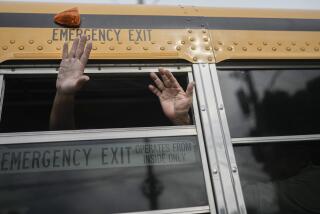Myanmar frees fewer prisoners than expected
- Share via
Reporting from New Delhi — Myanmar released fewer prisoners Wednesday than some activists and relatives expected, deflating hope that the regime was trying to dramatically improve its battered human rights reputation.
Between 120 and 300 detainees were set free out of a total of 6,359 granted a “humanitarian” amnesty that coincides with a religious holiday and a trip to India by President Thein Sein.
The number was difficult to pin down immediately because of staggered release times at prisons across the country, also known as Burma. The military government often puts political prisoners in remote areas to deter family visits and impede communication with outsiders.
Pro-democracy leader Aung San Suu Kyi said she hoped for many more positive steps from the government.
“The freedom of each individual is invaluable, but I wish that all political prisoners would be released,” she told reporters.
There had been hope this week that the number released might be higher after the government-controlled media aired a rare divergence in party line.
Although state television cited the oft-repeated argument that the country has no political detainees — just common criminals — the mouthpiece New Light of Myanmar newspaper published a request that “prisoners of conscience” be released.
Well-known comedian Zarganar was among those released Wednesday. Zarganar, who is believed to be suffering from heart disease, was arrested in 2008 after criticizing the government’s response to Cyclone Nargis, which killed tens of thousands of people.
Any hope by the regime that he would be contrite was quickly dashed.
“I am not happy at all, as none of my 14 so-called political prisoner friends from Myitkyina prison are among those freed today,” he reportedly said immediately after his release.
Notably absent from the list was Min Ko Naing, a leader of the 1988 student-led rebellion, who has been in and out of prison since he was sentenced to 65 years for staging street protests against fuel price increases.
The smalled than expected number of prisoners freed — some had hoped for at least 600 to 1,000 — belied recent small signs of liberalization. These include the easing of Internet restrictions, the announced halt in construction of a controversial Chinese-backed hydroelectric dam on the Irrawaddy River and the start of dialogue with Suu Kyi.
“We’re not satisfied with the release,” said Bo Kyi, a spokesman for the Thailand-based Assistance Assn. for Political Prisoners (Burma), an activist group. “We demand the release of all political prisoners.”
The goal of the prisoner release, analysts said, was to persuade the United States and Europe to lift economic sanctions, which would bring huge financial benefits to the government and its cronies.
Myanmar’s election in November saw its military-directed system converted to one nominally led by civilians. But critics said this was mere window dressing amid widespread allegations of vote fraud and rules that saw many key positions retained by top brass, with most lawmakers having military backgrounds.
Even as the amnesty on “humanitarian” grounds was announced this week, critics noted, recently detained political activists were on trial and a reporter imprisoned for photographing a bombing saw his sentence increased.
Thein Sein, the president, is in India on a three-day trip with several economic and security ministers, two days of which will be spent visiting religious sites such as Bodhgaya, where Buddhists believe Buddha attained enlightenment.
More to Read
Sign up for Essential California
The most important California stories and recommendations in your inbox every morning.
You may occasionally receive promotional content from the Los Angeles Times.










